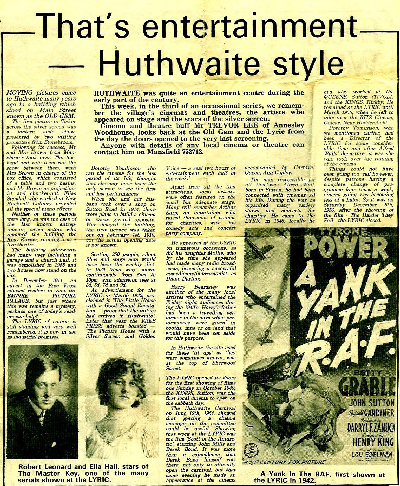Reference Library
Local Understandings
Mr. Trevor Lee
This article by cinema and theatre buff Trevor Lee, was believed published 1984 in the Notts Free Press. Family kept clipping shared by Miss Helen Wilson relates her Great Grandfather Elias Stendall, the known pianist at the first Huthwaite Picture House. The Lyric was incidentally where my grandfathers youngest brother Joseph Elliott had gained projection room employment.
That's entertainment
- Huthwaite Style
Moving pictures came to Huthwaite many years ago in a building which stood on Main Street known as the OLD GEM.
The first picture to flicker across the silver screen was a lantern slide show, presented by two visiting promoters from Stonebroom.
Following its success, Mr and Mrs Brown from Manchester took over. The husband and wife team ran the show between them, with Mrs Brown in charge of the box office, which consisted of a table and two basins, and Mr Brown as projectionist and chucker-out. Elias Stendall who worked at New Hucknall Colliery provided all the special piano effects.
Neither of these periods were long, as was the case of the last known entrepreneurs, seven actors who renamed the building the Kosy Korner, running it as a live theatre.
The building afterwards had many uses including a garage and a church hall, it was demolished in 1955 and two houses now stand on the site.
In December 1911, an advert in the Free Press advised readers to visit the EMPIRE PICTURE PALACE, but just where this was remains a mystery, perhaps one of today's readers can help?
The LYRIC of course is still standing and very well remembered, it is now in use as industrial premises.
Dorothy Tomlinson who ran the cinema for the last period of its life, thought that she may have been the only person to see the first and last performances.
When she and her husband took over a shop on Sutton Road in 1914, there were plans to build a cinema on waste ground opposite. War delayed the building, the first licence was taken out on February 1st, 1918, but the actual opening date is not known.
Seating 350 people, silent films and stage acts would have been the weekly diet. In 1920 films were shown continuously from 6pm to 10pm, with admission fees at 3d, 5d, 7d and 9d.
An advertisement for the LYRIC in March 1932, proclaimed it 'The Little House with a Good Sound Reputation - proof that the talkies had arrived in Huthwaite'. Later that year the FREE PRESS adverts boasted - 'The Picture House with Silver Screen and Golden Voice - a real two hours of entertainment each half of the week.'
Apart from all the film attractions, local artistes were often featured on the small but adequate stage. Many will remember Arthur Earp, an entertainer who raised thousands of pounds for charities, with his comedy acts and concert party company.
He appeared at the LYRIC on numerous occasions, as did his daughter Mollie, who by the time she appeared had made many radio broadcasts, becoming a successful comedienne/impressionist as Diane Darling.
Harry Beardsley was another of the many local artistes who entertained the Friday night audiences during the 1940's. Harry's father had been a travelling performer in the days when performances were given in booths, inns or on land that would have been set aside for this purpose.

In Huthwaite the site used for these 'fit ups' as they were sometimes known, was at the top of Sherwood Street.
The LYRIC opened its doors for the first showing of films one Sunday in October 1949, the KINGS, Sutton, was the first local cinema to open on the sabbath day.
The Huthwaite Carnival on June 12th, 1954, showed that getting a cinema manager on the committee could be useful. Showing that week at the LYRIC was the film 'Scott of the Antarctic, starring John Mills and Derek Bond. It was more than a coincidence that Derek Bond himself was there, not only to officially open the carnival, but that same evening he made an appearance at the cinema accompanied by Carnival Queen, Ann Copley.
The man responsible for all this was Alfred Wall, born in Sutton, he had been connected with cinemas all his life. During the war he organised many variety shows and concerts for charities. He came to the LYRIC in 1946, locally he had also worked at the QUEENS, Sutton (TIVOLI) and the KINGS, Kirkby. He remained at the LYRIC until March 1955, when he left to take over the RITZ Cinema, Golcar, near Huddersfield.
Dorothy Tomlinson, who we mentioned earlier, had been a Director of the LYRIC for some considerable time and after Alfred Wall's departure, it was she who took over the running of the cinema.
Things could not have been going too well however, despite patrons having a complete change of programme four times a week, cinema going was becoming less of a habit. So it was on Saturday December 8th, 1956, after the showing of the film - The Harder They Fall - the LYRIC closed.
1984 by Trevor Lee Updated 18 Mar 13
